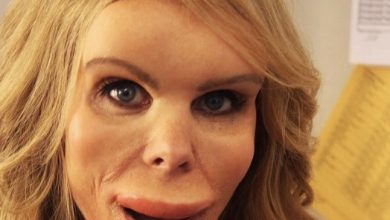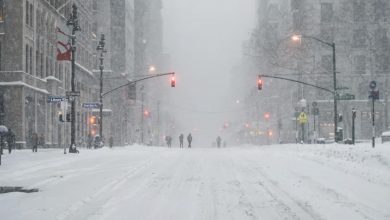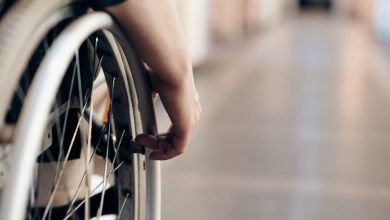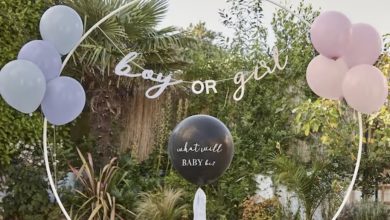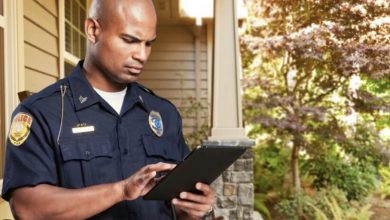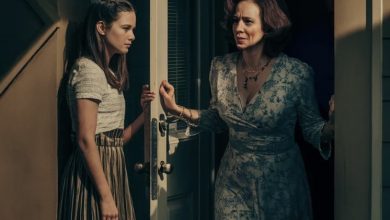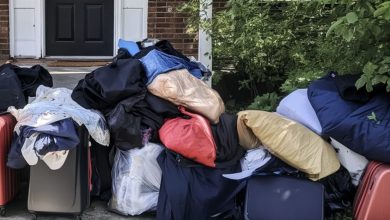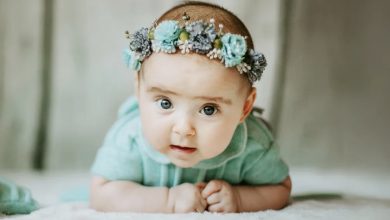No Eggs for a Cancer Patient: How My Father’s Riding Jacket Got Him Refused Service
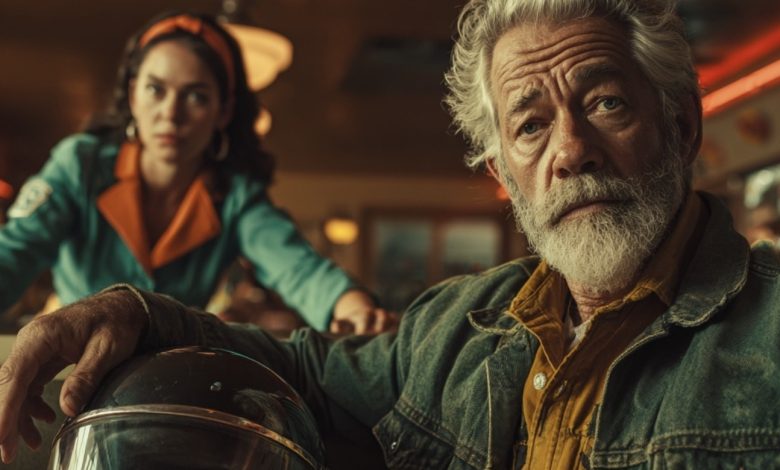
A few weeks ago, something happened that changed the way I see my husband’s father, Harold. It all began when my ninety-something mother-in-law died, and Harold, now seventy-two, was left alone. He’s been fighting lung cancer for months, going through one painful chemotherapy session after another, and he still rides his old Harley to every appointment. He wears his black leather riding jacket like a second skin – creased and worn, but filled with his memories of freedom.
That morning, I drove him to his chemo session. We live in a small town in the Midwest, where everyone knows everyone. Harold’s pickup truck had broken down the week before, and medical bills already eaten into most of his savings, so he couldn’t pay to fix it. He chose to ride his motorbike, because sitting on that seat gives him a rare sense of carefreeness in the midst of so much sickness. I drove my SUV behind him, scowling at the thought that he insisted on riding alone.
When treatment ended, he was weak and dizzy. His legs trembled every time he stood up. The doctor had pumped powerful poison into his veins to fight the cancer. It wasn’t from smoking – as I had foolishly assumed when I first heard “lung cancer” – but from asbestos dust he breathed in during decades as an industrial electrician. His lungs had taken on years of fine grit and metallic particles, and now doctors were doing everything they could.
He told me he was hungry and asked if we could get something simple to eat. He suggested Denny’s, because it was a few blocks from the hospital. He remembered sitting there with his late wife after church on Sundays, sipping coffee and talking quietly. I agreed but grumbled under my breath that he should just let me take him somewhere nicer. He doesn’t like “nicer.” He likes places he’s known for forty years.
I went inside the diner first and found a corner booth, pulling out my phone to scroll email while I waited. The sun was low, shining through big windows onto red vinyl seats. At a table behind me, a mother struggled to calm her tired toddler. Near the counter, a couple in matching tracksuits laughed about weekend plans. Everyone seemed at ease, except one young waitress who sniffed and stared out the window.
Harold came in wearing his helmet under one arm and that battered black leather jacket. He moved slowly, carefully lowering himself into the booth across from me. His gray beard was trimmed short, his eyes weary but still bright. I offered to push his shoulder, helping him settle in, but he waved me off with a gentle smile.
A moment later, the waitress strode over. She was maybe twenty-two, wearing a name tag that said “Madison.” Her tight ponytail bounced as she spoke. “I’m sorry, sir,” she said. “But we have a rule here. No gang members allowed. I can’t take your order.”
Every head in the restaurant turned. Harold looked up at her in confusion, hand no longer resting on his helmet. “I’m not in a gang,” he said softly. His voice trembled. The chemo makes everything shake – his hands, his legs, sometimes his voice. “I just want some eggs. I just had treatment. Maybe some water first?”
Madison crossed her arms and looked past him at me, as if seeking backup. “I’m just doing my job,” she said. “We’ve had problems with bikers before. They scare other customers.”
I felt my face go hot. I should have stood up right then. I should have said, “He’s my father-in-law. He’s dying. Now—” But I froze. A part of me quietly agreed that a man in leather might be intimidating. For years I had complained about Harold’s lifestyle: the weeks he spent on the road with other riders, the leather smell that clung to him, the metal studs that jingled when he moved. I had lectured him and my husband about safety, told them it was time for Harold to “grow up,” to act like a respectable senior citizen.
The restaurant manager came over. He was a tall man in his forties with a crisp white shirt and a pressed tie. He looked at Harold like he was an unfamiliar guest on the wrong side of an invisible line. “Is there a problem?” he asked Madison.
She nodded and pointed at Harold. He barely registered it. The manager took a step closer. He glanced at me then back at Harold’s jacket. “Sir,” he said to my father-in-law, “we have a policy—”
He used the same words, the same tone Madison had: “There’s a truck stop about ten miles down the highway where bikers are welcome. Maybe you’d feel more at home there.”
Harold’s head dropped forward, shoulders slumping. The manager and Madison shared a look of satisfaction, as if they had just rid the diner of something unworthy. The entire room fell silent. The other customers shifted in their seats, some looking away, others sneaking glances at Harold’s head hanging low.
When Harold stood up slowly, helmet in one trembling hand, I finally moved. By the time I caught up to him at the door, he had already turned the knob. He stood there for a second, breathing in the morning air as though it were a precious gift. Then I saw the tears. They trickled down his weathered cheeks, wetting the collar of his leather jacket.
“Dad,” I said, but my voice was small. He turned to me with such hurt in his eyes that I felt my chest tighten. “I’m so sorry,” I mouthed, but I could hardly look him in the face. He shoved the door open, walked to his motorcycle, and leaned against it, wiping his tears on his sleeve.
I joined him outside, handing him a bottle of water. He opened it with shaky fingers, took a gulp, and exhaled slowly. He never said a word about how he felt. He just sat there, silent, facing away from the diner.
It wasn’t until we were back in the SUV, driving down the highway in a convoy of two vehicles, that Harold finally spoke. His voice was soft, but it cut deeper than any knife. “You didn’t stand up for me,” he said. “You sat there and let her humiliate me.”
I swallowed hard. My shame made my throat dry. All my excuses – the need to mind my own business, the fear of making a scene – vanished in that moment. I opened my mouth to speak, but the words wouldn’t come. Instead, I reached over and gripped his hand.
After a long silence, he whispered one simple thing: “I just wanted breakfast.”
That afternoon, I replayed the entire event in my mind. I saw my own reflection in the diner window, arms folded across my chest, too afraid to stand up for a man who had given me more kindness than anyone else I know. I thought of all the times I had mocked him for wearing leather. I thought about how I had insisted that our own children never ride with him, even though he always buckled their helmets and drove at a safe, careful pace.
For fifteen years, I had held tight to my own narrow view of respectability. I thought that someone who wore a motorcycle jacket with patches and studs was less civil, less worthy, almost dangerous. But now I saw how shallow and cruel that belief truly was.
That evening, I called my husband, Paul, who was at work. I told him everything. He was silent for what felt like an eternity. When he finally spoke, his voice cracked. “He just wanted eggs,” he said. “A simple meal after the hardest day of his life. And you let them chase him out.”
I wanted to explain, to apologize, to make it right. Instead, I cried. I cried for Harold, for my own blind prejudice, and for the time we would never get back.
Paul came home early. He went straight to Harold’s apartment, which sits on the edge of town. That night, he discovered that his father had collapsed on the floor and fallen into a deep sleep. The chemo had drained him completely, and the humiliation of being turned away from that diner had hurt him more than the cancer medicine ever could.
The next morning, I received another phone call. This time it was from the hospital. Harold was awake but very weak. He asked for his motorcycle jacket. He said he wanted to ride one last time, just to feel the wind on his face again. The doctors said he was delirious, but I knew it was his final wish.
I ran to the hospital and found Harold lying on a bed in a bright room. Paul was holding his hand. When he saw me, he tried to smile. “Planning to tell me I can’t wear this in heaven, too?” he joked weakly.
I sat beside him and took his hand. “I love you,” I said. “I’m so sorry I let them treat you that way.”
He squeezed my hand and laughed softly. “You finally learned something,” he said. “Took you long enough.”
Harold passed away that afternoon. He died not in a cold hospital bed but in the garage of his own home, surrounded by his Harley and his riding pals. Paul and I arranged for him to be released from hospice care so he could have his last moments where he felt most comfortable. His friends, a whole community of bikers, carried him out on his bike, and he took one final drive around the block before returning home.
His funeral was unlike any other service I had ever attended. Instead of black suits and somber ties, hundreds of motorcycles filled the street. Riders wore leather vests covered in patches that told stories: rides for charity, late-night jamborees, years of friendship. They spoke of Harold’s generosity, how he paid for young riders’ repairs, how he volunteered at the fire department and never turned anyone away.
To my surprise, Madison – the young waitress who had driven Harold away – arrived at the back of the crowd. She held her uniform in her hands, tears rolling down her cheeks. After the service, she approached me. “I’m so sorry,” she said. “I didn’t know. I just thought . . . I didn’t think he was a person.”
I started to say something harsh, but then I remembered my own cruelty. I surprised myself by pulling her into a hug. “It’s okay,” I whispered. “I understand now. We all make mistakes.”
Paul rode Harold’s bike to the cemetery, leading a procession of riders. The roar of engines echoed like a salute to a life well lived. I followed behind in our car, watching the endless stream of motorcycles wind through the streets. I felt pride instead of shame.
After the burial, Paul turned to me. “He left me the bike,” he said. “He said he wanted me to keep riding.”
I nodded and smiled through tears. “Then ride we shall,” I replied. “With pride.”
It’s been a year since Harold died. Paul rides his Harley every morning, wearing Harold’s worn leather jacket. I make sure our kids wear their helmets and protective gear when they come along. We still return to that Denny’s sometimes – new manager, new staff – and no one says a word when we walk in. But I see the uneasy looks, the quick glances at our leather as we sit down.
Paul shrugs and winks at me. “They still see what they want to see,” he says. I hold his hand and tell him, “Then we’ll help them see better, one person at a time.”
Harold’s bike stands proudly in our garage, polished and ready. Our daughter just got her learner’s permit, and our son wants to learn too. When they ask about leather jackets and long road trips, I smile. I remember what Harold told me in his last moments:
“It’s not about the bike. It’s about refusing to let the world make you smaller or quieter. It’s about riding the road of life on your own terms, taking up space even when people tell you you don’t belong.”
Now, whenever I see an older rider on a dusty road, I nod and wave. I imagine Harold up there beside me, smiling. And I know that sometimes, the real danger lies not in the leather jacket, but in the assumptions we carry in our own hearts.

